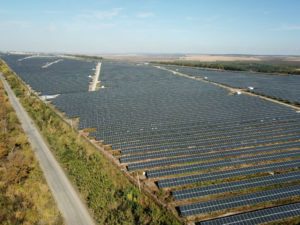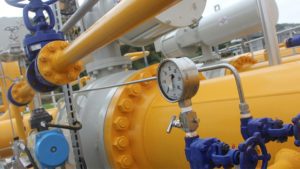
The Dniprovsky Plant of Mineral Fertilizers has launched production of the compound fertilizers (NPK) with perspective to produce 75,000 tonnes of NPK by the end of 2019, Vice President of the Union of Chemists of Ukraine Serhiy Liskovsky said.
“A long-term agreement to supply the main raw materials was signed. Every month we’ll produce 15,000-18,000 of the compound fertilizers,” he said.
Liskovsky said that the production program foresees production of liquid nitrogen-phosphate NP fertilizers (8:22), pelleted fertilizers (10:32), and production of the NPK-compound fertilizers (16:16:16) is scheduled for the second half of August.
Liskovsky reminded that for the last five years the plant has been working with the interrupts, by 20-25% of its capacities, in terms of absence of the raw materials inside the country and expensive import.
“For this period a share of Ukrainian enterprises on the domestic market of compound fertilizers dropped by 10% and by 2-3% on some positions,” he added.
According to Liskovsky, state-owned enterprise Sumykhimprom with a capacity of 40,000 tonnes per month also will produce compound fertilizers. By the end of the year, two enterprises aspired to produce 275,000-280,000 tonnes of products.
According to the Chemists Union of Ukraine, Ukraine needs 1.2 million tonnes of compound fertilizers annually, 1.3 million tonnes meant for import.
DNIPROVSKY PLANT, FERTILIZERS, MINERAL FERTILIZERS, NPK, PRODUCTION

The National Commission for Energy, Housing and Utilities Services Regulation (NCER) has set feed-in tariff at 15.03 eurocents per kWh for Nick Solar2 LLC with a capacity of 15.4MW and Nick Sunstar with a capacity of 13.3 MW (Bashtansky and Voznesensky districts, Mykolaiv region).
The commission approved this decision during a meeting on July 30.
The tariff is set until January 1, 2030.
NCER also set feed-in tariff for Nick Green LLC with a capacity of 9 MW and Sunstar Pryvilne with a capacity of 7.4 MW (Veselynivsky and Bashtansky districts of Mykolaiv region).
Also, Ukrspecstroy Plus LLC with a capacity of 21.669 MW received the aforementioned tariff (Dniprovsky district of Dnipropetrovsk region).

The partnership of Canadian Vermilion Energy Inc. and Ukrgazvydobuvannia in a joint project on development of three oil and gas fields in Ukraine under production sharing agreements (PSA) is now 50/50, according to its second quarter year report.
“Entering Ukraine aligns with our strategy to capitalize on opportunities in under-exploited basins by using modern technologies to improve success rates and recovery,” reads the document.
Vermilion said that subsequent to the end of the second quarter of 2019, it entered into a 50/50 partnership with Ukrgazvydobuvannia and were awarded two exploration licenses in Ukraine, subject to a final production sharing agreement.
“The licenses cover approximately 585,000 gross acres situated in one of Europe’s most prolific natural gas regions (Dniprovsko-Donetsky Basin). The new licenses are in close proximity to several multiTCF gas fields with most of the basin (and awarded license areas) still uncovered by 3D seismic. The terms of the licenses include a modest capital commitment, back-loaded over a five-year time frame,” reads the report posted on the company’s website.
As earlier reported, Canada’s Vermilion Energy jointly with a Ukrainian company (Ukrgazvydobuvannia) has won the right to develop three oil and gas fields in Ukraine.
On July 1, an interdepartmental commission for organizing the conclusion and implementation of the product sharing agreements (PSA) prepared for the government proposals on the winners in nine continental hydrocarbon sectors put up for auctions. Among them are Ukrgazvydobuvannia in alliance with Vermilion for Balakliyske and Ivanivske fields, Ukrgazvydobuvannia for Berestianske and Buzivske, private company Ukrnaftoburinnia for Rusanivske, U.S. Aspect Energy for Varvynske, DTEK for Zinkivske, Geo Alliance for Sofiyivske and Zakhidnadraservis for Uhnivske fields.
The head of the office of the National Investment Council, Yulia Kovaliv, said that now within two months companies must agree on the contracts themselves and sign agreements with the government in order to start exploration as soon as possible and to start work as soon as possible. She also said that the volume of investments of the winning companies is $430 million in the pessimistic scenario.
According to Vermilion report, its quarterly production volumes by approximately 1,300 boe/d and FFO by approximately $11 million, we recorded corporate production of approximately 103,000 boe/d, little changed from the previous quarter.

The net profit of Universal Bank (Kyiv) in January-June 2019 amounted to UAH 268.46 million, which is 5.7 times more than in the same period of 2018.
According to the report posted on the bank’s website, the net interest income of the bank in the first half of this year increased by 2.4 times compared with the corresponding period of 2018, to UAH 452.967 million.
The bank’s assets for six months of this year rose by 42.3%, to UAH 12.034 billion, in particular loans to customers were by 41.1%, up – to UAH 6.612 billion.
Since the beginning of the year, the bank’s liabilities grew by 43.4%, to UAH 10.898 billion, its net worth increased by 32.1%, to UAH 1.136 billion. Charter capital remained at the level of UAH 3.103 billion.
Universal Bank is part of TAS Group of businessman Sergiy Tigipko, which was founded in 1998 and has assets in financial and industrial sectors, agriculture, real estate, pharmaceuticals and venture projects.

A subsidiary enterprise Ecomix has said it is going to acquire 9.289 million of the ordinary nominal shares of PrJSC Mega-Polis insurance company (both Kyiv-based) that totals 74.3161% of a charter capital of the insurer.
According to the Ukrainian National Securities and Stock Market Commission’s information disclosure system, a total principal value of the package is UAH 9.289 million.
Ecomix was registered in May 2000 with a charter capital worth UAH 5,394, According to the Unified State Register of Legal Entities and Individuals, the company deals with wholesales of wooden and building materials. PrJSC Panacea Trade Limited and three Cypriots are the shareholders of the company.
Mega-Polis was founded in 2000. It specializes in risk insurance.
PJSC Diamantbank (Kyiv) has become the owner of 74.3161% of the shares of Mega-Polis insurance company (Kyiv), the National Depository of Ukraine said this on January 30, 2019.
At the same time, the report states that the insurance company does not own information, as a result of what actions (acquisition or alienation) and how (directly or indirectly) the change of ownership of securities occurred. It is emphasized that the previously the specified bank did not own shares of the insurance company.
According to the National Commission on Securities and the Stock Market, as of the fourth quarter of 2018, the owner of 74.3161% of Mega-Polis was Energotechprom LLC, and another 24.96% was owned by Serhiy Perelom.

The European Bank for Reconstruction and Development (EBRD) will provide investment up to EUR 149 million to Ukrenergo National Energy Company to acquire up to 26 new transformers and carry out the automation and upgrade of 12 high-voltage substations. “The investment will help Ukrenergo upgrade its key transmission infrastructure required for the synchronization with the European electricity networks. It will also assist Ukraine in aligning its legal framework and operational practices with the EU Third Energy Package,” reads an EBRD press release.
According to the bank, Ukrenergo will use the 15-year sovereign-guaranteed loan to acquire up to 26 new transformers and carry out the automation and upgrade of 12 high-voltage substations in key locations of the Ukrainian transmission network. The loan will also contribute to the annual reduction of CO2 emissions by 20,500 tonnes.
Besides, the investment will strengthen Ukrenergo’s capacity to accommodate the growing share of renewables in the Ukrainian grid, with an increasing share of wind and solar power. “A flexible, smart grid will be key to the sustainable electricity sector of the future,” said the report.
The EBRD financing is also promoting the commercialization and institutional development of Ukrenergo through the implementation of a comprehensive Corporate Governance Action Plan and robust procurement standards.
As reported, the total cost of Ukrenergo modernization project is EUR 198.2 million, including EUR 49.2 million of own funds of Ukrenergo and EUR 149 million to be provided by the EBRD.
The EBRD is the largest international financial investor in Ukraine. Since the start of its operations in the country in 1993, the Bank has made a cumulative commitment of almost €13.6 billion through 432 projects in the country.